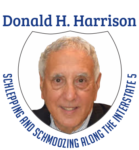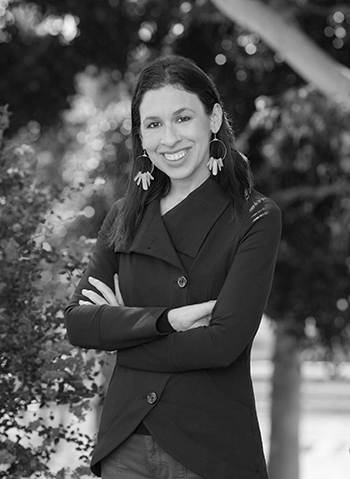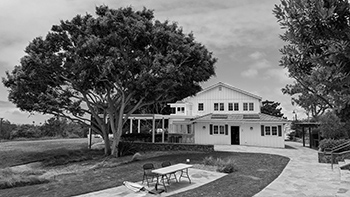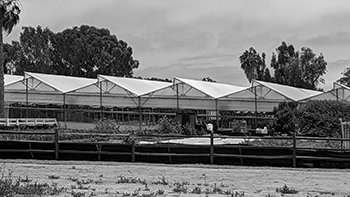 Editor’s Note: This is the 13th chapter in Volume 3 of Editor Emeritus Donald H. Harrison’s 2022 trilogy, “Schlepping and Schmoozing Along the Interstate 5.” All three books as well as others written by Harrison may be purchased from Amazon.com.
Editor’s Note: This is the 13th chapter in Volume 3 of Editor Emeritus Donald H. Harrison’s 2022 trilogy, “Schlepping and Schmoozing Along the Interstate 5.” All three books as well as others written by Harrison may be purchased from Amazon.com.
Schlepping and Schmoozing Along the Interstate 5, Volume 3, Exit 41B (Encinitas Boulevard): Leichtag Commons
From northbound Interstate 5, take the Encinitas Boulevard exit, and turn right (east) and quickly make a left onto Saxony Road. The Leichtag Commons is on the right side of the street at 441 Saxony Road.


ENCINITAS, California –While a student at UC San Diego, Charlene Seidle took a job as an intern at the Jewish Community Foundation and was taken under the wing of its CEO Marjory Kaplan. She was invited to stay beyond her internship and the next 17 years saw Seidle developing numerous projects as she rose through the Foundation’s ranks. Among projects bearing her stamp were the creation of a Teen Philanthropy program and the development of the On-the-Go program that provides rides for older adults.
Seidle said that Kaplan, who is now retired, was her mentor. Kaplan taught her the concept of “service leadership,” which involves being responsive not only to the philanthropists who fund various projects but also to her work colleagues and to the recipients of the philanthropy.
“The wellbeing of the staff and the team is no less important than the donors who are being served, and the same with the grantees,” she said. Kaplan also instructed her about maintaining a sense of humility while serving as a leader. “It was not what she said, but what she showed me,” Seidle said. It’s important “to use power for the good and give others voice rather than for one’s own purposes.”
Seidle was preconditioned to learn such lessons by her parents, Stanley and Deborah Seidle. Her father was from Plumtree, Rhodesia (today Zimbabwe). His father escaped pre-war Vilna and rose to become the mayor of that small town on Rhodesia’s border with Botswana. Nine of his uncles and aunts disappeared in the Holocaust, believed murdered by Nazi forces that occupied Vilna, Lithuania. Her mother was from South Africa. Together the family moved to London, England, where Charlene was born, then to Philadelphia, and finally to San Diego when Charlene was six. While her parents were helping to establish and strengthen the Orthodox Congregation Adat Yeshurun in La Jolla, she attended San Diego Jewish Academy and Soille San Diego Hebrew Day School before attending and graduating from La Jolla High School.
As a result of her Jewish education, Seidle reflected, “I feel very confident in any Jewish space.” Her younger sister, Rachel Eden, also became a Jewish communal worker. Rachel’s career included running women’s programs in New York for Aish Ha Torah, returning to San Diego to become a teacher and preschool director at Soille San Diego Hebrew Day School, a columnist for the San Diego Jewish Journal, and a successful life/ relationship coach.
While living with their parents, Seidle said, “we both were very much encouraged to give back to the Jewish community, and I think that had an effect.”
Helping families to plan their charitable giving was “something that I loved,” Seidle reflected during an April 2022 interview. “There is something about the intimacy of that kitchen table conversation, very special,” she said. “How wonderful it is to be able to witness the good in the community in so many ways. For example, in the Ukraine crisis where we in so many ways are seeing the worst in people, you also really see the best in people. Philanthropists and social activists are stepping up. Organizations are working day and night to be sure that refugees have a warm meal and clothes on their back.”
Promoted again and again by the Jewish Community Foundation, Seidle was entrusted with becoming the key staff member and liaison with the Leichtag Foundation. That Foundation had been created by Lee and Toni Leichtag who made many millions of dollars marketing a generic substitute for Ritalin, a medication used in the treatment of Attention-Deficit Hyperactivity Disorder (ADHD). The Leichtags’ vision “was that their daughter Joli Ann Leichtag (for whom an elementary school in Vista is named) would be president of the family foundation and that she would carry out their philanthropic legacy,” Seidle recounted. However in 2007, Joli died of lung cancer and months later Lee was killed in a car accident. “Toni was really in poor health at the time, and she resigned from the family foundation the very same day,” Seidle recounted. “She couldn’t deal with all the stress of having her daughter and husband pass away within a few months, and also having her own health problems. So, overnight the family foundation turned into an independent foundation.”
While the independent foundation had a board consisting of friends of the Leichtags, it didn’t have a mission statement nor many people with philanthropic knowledge. Attorney Jim Farley, who had handled legal affairs for the Leichtag family’s business, became the independent Leichtag Foundation’s president and chief executive officer. “He and the board made a decision that they would hire the Jewish community Foundation to do some consulting for them and to be their staff” because “it was the largest grant-making organization in San Diego. It is very well respected, well governed, very experienced organization.”
Seidle was chosen to lead the team at the Jewish Community Foundation which worked for Leichtag. “I had shared responsibilities,” she said. “I remained the vice president for philanthropy at the Jewish Community Foundation, promoted sometime during that period to senior vice president. At the same time I had a title at Leichtag as executive director.” Eventually, she became a fulltime employee of the Leichtag Foundation.
That conferred upon Seidle the responsibility for working together with the board and Farley to steward approximately $140 million in philanthropic funds, as well as some non-cash assets. After studying what the Leichtags had given to and valued in their lives and also assessing key community needs, four broad philanthropic goals were enunciated by the Leichtag Foundation. These were: 1) Building Jewish life and institutions in the North County Coastal area, stretching from Del Mar to Oceanside. 2) Helping impoverished people achieve self-sufficiency, the Leichtags themselves having experienced poverty in their youths. 3) Building strong relationships between San Diego County and Israel, based on shared values and interests. 4) Underwriting projects in Jerusalem that improve living conditions and promote trust among its ethnically diverse residents.
“We consider ourselves a foundation with two localities: North San Diego and Jerusalem,” Seidle said. “In Jerusalem there is no clear majority. About a third is Palestinian, about a third is ultra-Orthodox Jewish, and about a third is secular/ modern Orthodox Jewish.”
The family foundation was succeeded by the independent foundation. Subsequent to the strategic assessment process, its board decided to spend down most of its assets by 2025, leaving between $30 and $50 million for the Jewish Community Foundation to continue philanthropy in the Leichtags’ four areas of interest. “The reason for the time limit was to create real urgency,” Seidle said. “The time limitation was to focus on the present day, the needs of now, rather than worrying too much about what the balance would be 100 years from now. Because there are no family members who continue to be involved in the governance of the Leichtag Foundation, the board thought that Lee and Toni wouldn’t love the idea of people 100 years from now with no connection to them making decisions about funds they had earned in their lifetime.”

However, after the Leichtag Foundation acquired a 67-acre agricultural property from flower grower Paul Ecke in 2012, “we began to absorb the opportunity of this property. There was a conclusion that 2025 was unrealistic, so that year was taken off the table,” Seidle said. “But we still are a very much limited-life foundation, although the board hasn’t yet set another year per se.”
The purchase of the property was an outgrowth of the foundation’s research into how Jews in the North County would like to see their community grow. Only about eight or nine percent of the Jews in that section of the county were affiliated with a synagogue or with any other Jewish organization. About 80 percent of the Jews “traveled through life with people who aren’t Jewish,” Seidle said. “Either they are intermarried, or they have children who aren’t fully Jewish. They might identify with another faith, or none.”
In focus groups, Leichtag learned that North County Jews “felt connected to the earth, to what they eat, to healthy living for themselves and their neighbors, and social justice,” Seidle said. “They talked about seeking opportunities to get together with other people with Jewish identity, but not necessarily in a synagogue setting. They wanted some other more informal setting – a Jewish deli or outdoors.” They also wanted to have a space “that would be extremely welcoming an inclusive to those family friends, neighbors, who didn’t identify as Jewish.”
Aware that hunger was a growing issue in North County, “we started a study in 2009” that found “one in seven people in North County didn’t know where their next meal was coming from,” Seidle said. “Over the nine months that we were doing the study, that statistic changed to one in six.”
“At the same time,” she said, “we were looking at some of the ways that we were supporting the Israel/ San Diego connection. There was a Memorandum of Understanding signed between Israel and California to work together around water, technology, and agriculture. All these catalyzed the idea of buying the property. While we didn’t have a master plan for it, when we acquired it at the end of 2012, we had a general idea of some things we wanted to do: establish a Jewish community farm where people who were environmental activists, or people who cared about social justice, or had an interest in agriculture, could come together with their Jewish identity.”
“We saw opportunities in the Leichtags’ second interest area – self-sufficiency—to start a food justice fellowship, intensify food production, and to increase areas of access to fresh food for those who are struggling financially,” Seidle said
“And then the San Diego-Israel piece in terms of Israel being such a global leader in the use of water. All that came together with the unique opportunity where the Eckes were looking to sell this property, which was the last bastion of what once was hundreds of acres of flower-growing in this region.”
Today one third of old Ecke property—known today as Leichtag Commons—is farmed by the Coastal Roots Farm, a Jewish communal farm started by the Leichtag Foundation and eventually spun off as a separate organization. Chosen as its executive director was Javier Guerrero, formerly executive director of the San Diego Children’s Discovery Museum of Escondido and before that the deputy director of the Museum of Man (now the Museum of Us) in Balboa Park.

In addition, Leichtag Commons in April 2022 had 14 rent-paying tenants, who utilized 900,000 square feet of greenhouse space spread over the second third of the property. Gold Green Agriculture farms five acres hydroponically – “the nation’s first certified organic hydroponic farm,” Seidle said. “They are the Happy Living brand that you can buy at Whole Foods and hundreds of other retail outlets, with lettuce and greens that you buy in clamshell containers.” Another tenant is Fox Point, a flower-growing business which has its busiest season around Easter and Mother’s Day.
Among the 14 tenants is a project of the Salk Institute for Biological Studies which is conducting experiments with plants to ameliorate the effects of climate change, Seidle said.
The final third of Leichtag Commons is utilized for community space, Seidle said. “We knew we wanted to establish a coworking space for all kinds of community organizations, nonprofits, and social enterprises to have some space to interact creatively and to work from.” That area is known as the Hive. Among its anchor tenants is the international headquarters of Moishe House, which was discussed in the previous chapter about Terry Wunder. Another is the Murray Galinson San Diego-Israel Initiative, which brings Israeli professors to major university campuses in San Diego County (as was outlined in the second volume of this three-volume book.)
Likewise in Jerusalem, the Leichtag Foundation hosts a coworking space through its Jerusalem Philanthropy Initiative. “We specifically chose a location that is close to the seam line – the 1967 border. It is right in the center of the city. We converted a store front, with huge windows.” An organization known as “The Jerusalem Model” includes 250 civil society activists and social entrepreneurs, representing the three main segments of Jerusalem society – Palestinians, ultra-Orthodox Jews, and modern/ secular Jews. Its members have access to the working space.
“Tons of people pass there on any given day and every third person stops and looks, trying to take in this space where you see women with hijabs, black-hat men, and people in cutoff shorts all in the same space!” Seidle said. “Everything we do there is very pragmatic. There are shared needs like professional development, budgeting, fundraising, nuts-and-bolts kinds of issues or needs concerning community space, or governance. We don’t get involved in anything political but rather in efforts to uplift the city, very much from the ground up.”
She commented that Jerusalem is a city of more than 50 distinct neighborhoods, some large, others small, each with its own parent associations and councils which sponsor communal activities. The Leichtag Foundation has three major areas of grantmaking interest in Jerusalem. One is improving the quality of life for young people in Jerusalem, particularly through bridging activism and culture. Another is to develop workforce opportunities and career opportunities for ultra-Orthodox Jews. The third is to improve economic conditions in Palestinian-majority East Jerusalem.
“Jerusalem is like three cities in one,” Seidle said. “We work with the municipality in a lot of ways” to build a sense of community, including the teaching of civics – how does the government work – to the diverse residents. Leichtag sponsors a fellowship program for 15 people who appear to be up and coming leaders in their neighborhoods.
“We want people in the political pipeline to have experiences with the ‘other’ that aren’t at an army checkpoint, but are side-by-side, positively interacting in some way,” she said.
*
Donald H. Harrison is editor emeritus of San Diego Jewish World. He may be contacted via donald.harrison@sdjewishworld.com